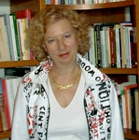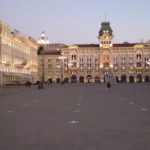In autumn, as the days grow dark early, she has never liked being on her own. A flock of birds in a semi-park near her home makes her think of her own departure. What she is leaving and what she will find. She is leaving a semi-relationship with her best friend’s best friend. She smiles. In an age where people jump into bed together and ask each other’s names later, they are among the few to have been seeing each other for months, who want each other, but have never made love.
The more Francesca feels attracted to him, the more defences she puts up against her fears and paranoia. Loving takes quite some courage. She evidently doesn’t possess it.
In any case she’s leaving. Spring in Patagonia. Animals and plants from a world that is still partly uncontaminated. Where there are no supermarkets. Where the sea is an ocean. Where the distances are enormous. The world at the end of the world.
She starts wandering around her too-quiet home. Her husband is away for work. When her husband is away she misses him. In bed the sheets are cold. Perhaps she should adopt a cat. Stroking an animal is always very comforting. She loves Antonio as if he were a large animal that had been living with her for years.
Giulio’s Trieste is the Trieste of Grignano, beach facilities, pretty girls tanning themselves in the sunshine. Giulio’s Trieste is the Trieste of the narrow streets around Cittavecchia, where he wanders in the evening, waiting for Monica to finish work. Giulio’s Trieste is a Trieste of seafront restaurants, where they serve mediocre fish and you can sit outside late into the night. Giulio’s Trieste is Monica’s Trieste, but without him understanding why, it has also become Francesca’s Trieste. Francesca has slipped discreetly into his life. Soundlessly. Gradually. She got into his mind without competing for space with her dearest friend, without doing anything, but she dug a space within him, made predominantly of lack, the desire for something that is not clearly defined. Francesca is unlike anyone he has spent time with before, and while on the one hand this attracts him, on the other, it almost frightens him. She is a strange twenty-first century alien.
In autunno, quando le giornate diventano presto buie, non le è mai piaciuto ritrovarsi da sola. Un volo di uccelli in un quasiparco vicino a casa la spinge a pensare alla sua partenza. A quello che lascia e a quello a cui va incontro. Lascia una quasi relazione con il migliore amico della sua migliore amica. Sorride. Sono tra i pochi in un’epoca in cui la gente prima va a letto e poi si chiede il nome, che si frequentano da mesi, si desiderano, eppure non hanno mai fatto l’amore. Più Francesca si sente attratta da lui, più schiera a difesa ubbie e paranoie. Per amare ci vuole un certo coraggio. Evidentemente lei non lo possiede.
Intanto è di partenza. Una primavera in Patagonia. Animali e piante di un mondo ancora parzialmente incontaminato. Dove non ci sono supermercati. Dove il mare è oceano. Dove le distanze sono enormi. Il mondo alla fine del mondo.
Si mette a girare per la casa troppo silenziosa. Suo marito è via per lavoro. Quando suo marito è via le manca. Nel letto le lenzuola sono fredde. Forse dovrebbe adottare un gatto. Accarezzare un animale è un sempre grande conforto. Ad Antonio vuole bene come a un grosso animale che da anni vive con lei.
La Trieste di Giulio è la Trieste di Grignano, degli stabilimenti balneari, delle belle ragazze che si abbronzano al sole. La Trieste di Giulio è la Trieste dei vicoli attorno a Cittavecchia, dove vaga la sera nell’attesa che Monica stacchi dal lavoro. La Trieste di Giulio è una Trieste di ristoranti sulle Rive, dove si mangia pesce mediocre e si può restare all’aperto fino a tarda notte. La Trieste di Giulio è la Trieste di Monica, ma è diventata anche, e non sa neppure lui perché, la Trieste di Francesca. Francesca è penetrata con passo discreto nella sua esistenza. Senza fare rumore. Poco a poco. È entrata nella sua mente senza contendere spazi all’amica più cara, senza fare nulla, ma ha scavato in lui una nicchia che è soprattutto mancanza, desiderio di qualcosa di non ben definito. Francesca è diversa da tutti quelli che fino ad allora ha frequentato e, se da un lato lo attrae, dall’altro gli mette quasi paura. È una strana aliena del ventunesimo secolo.
da le Parole blu di Marina Torossi Tevini (Campanotto 2010)
(traduzione di Caroline Hendelson)

